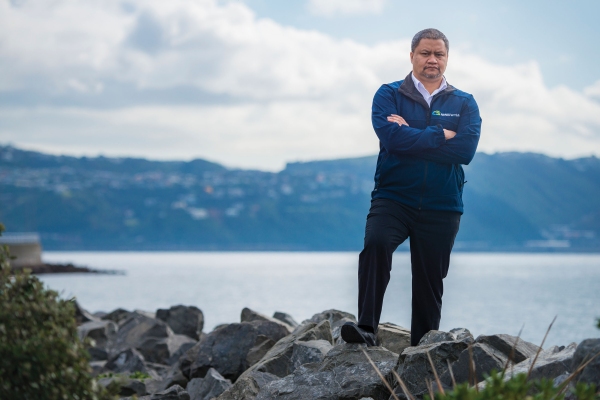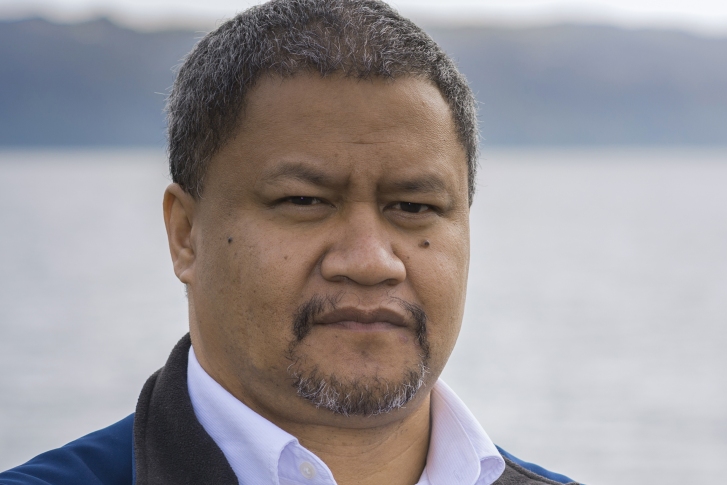Marino Tahi is a man who speaks volumes between sentences.
If he knows the commanding effect of the long pauses he takes before answering a question, he shows little sign. Direct a question at him and he will look at you, flex his facial muscles, shift in his chair and think.
You are best to wait, and to watch. What seems to be going on is a furious internal debate about what, and how much to say that will result in the most meaningful response. The reward for his consideration is to be let in on a carefully constructed and thought-provoking conversation with someone who is spearheading something of a revolution at NIWA.
Those who know him well remark on the huge advances he has made since he first arrived at his Hamilton base a little over 12 months ago. He is the head of Te Kūwaha, NIWA’s Māori environmental research team, a role he says is not the easiest to explain.
“On the one hand it’s about developing sustainable relationships and growing capability, on the other it’s about crystallising research opportunities, I suppose. Then at an organisational level it’s about developing an approach to position NIWA to be the trusted partner for Māori in the Māori development space.”
Co-development of research
Te Kūwaha is unique as a team dedicated to helping Māori communities by providing the latest scientific knowledge and tools so they can manage their natural resources. Fundamental to Te Kūwaha is partnership and collaboration with Māori—and a determination to ensure that the skills needed within NIWA to achieve this grow alongside an awareness of tikanga and te reo.
“The way I see it, there are two types of projects at NIWA. We’ve got a mainstream research project that looks for a Māori add-on, an end user—and Māori don’t have any sort of role in that research other than to be someone who might be interested in the results alongside every other end user out there."
“At the other end of the spectrum we have research that has been co-developed, that is Māori-centric and has a strong element of them driving, contributing and participating in the research. That’s the space Te Kūwaha is in.”
Whanuangatanga and empowerment
It is fair to say that Te Kūwaha has made huge strides in the past year. Tahi is making things happen, say his colleagues—a clear Māori strategy has been established, core funding has increased, staff with extensive experience working with Māori organisations have come on board, cultural-development programmes rejuvenated, and in the large, complex organisation that NIWA undoubtedly is, there is a sense among Te Kūwaha staff that they are becoming a lot more visible.
Tahi, predictably, has a different take.
“Collaboration is key. If you enable and empower your people to succeed, then the team will succeed, and if the team succeeds then the organisation succeeds.”
This is a principle embodied in the broader Māori value of whanuangatanga that includes family connections and a sense of belonging. It was whanaungatanga that surrounded Tahi as he grew up. Family, and in particular his grandparents who adopted him as a baby, remain the greatest influence on his life. Tahi is 43 and Tuhoe, affiliated to hapu Te Urerewa, Tamakimoana, Te Paenga, Ngati Rongo, and Ngati Kuri. The small town of Ruatahuna in the heart of Te Urerewa is his home. Ruatahuna is two hours’ drive to Rotorua, twice that to Gisborne and best known for its association with influential Māori spiritual leaders Te Kooti and Rua Kenana. And as the hometown of the great Māori singer Prince Tui Teka.
“It’s a small community, everyone knows everyone. It’s very strong on whanau-based and hapu-based values, and back when I was young, we didn’t have technology so basically we made our own fun—eeling, hunting, staying out in the bush, horse riding, all that.”
Tahi, like most children from Ruatahuna, went to boarding school for his secondary education and from there to university.
“My grandparents expected I would go. To be fair they wanted me to get out of the bush, so as to speak, get an education and see the wider world. They saw that as important because there was no employment future for young people in Ruatahuna at the time.”
So Tahi enrolled at Victoria University in Wellington and studied commerce and Māori. After graduating he moved to Rotorua, working for Skills NZ as a contract manager and from there back to Wellington to work for Te Puni Kōkiri as a policy analyst. He discovered a passion for Māori business development in a stint at New Zealand Trade and Enterprise, using that experience to set up his own consulting business working with iwi, government and the private sector to engage and deliver services in the Māori development space.
“At the time the treaty settlement process was in full swing, assets were being returned to tribes and there was a big focus on managing those assets for the benefit of their people. There were some big players coming through and the Māori economy was starting to take off.”
Before working at NIWA, Tahi spent a decade at Landcare Research in Palmerston North as its Māori partnerships manager, getting more involved in Māori economic development and the research needed to drive it forward. Then he decided he needed a change—NIWA provided him the opportunity to help shape the company’s future while helping iwi build their capabilities and achieve.
“Science enabling Māori development is an exciting area to be in and essentially this is the dream job—developing opportunities for Māori and getting paid to do it.”
Tahi is at his most passionate explaining the satisfaction he derives from his work in helping others, and at his most reticent when asked what he does outside work.
But with a hint of a smile he replies: “In my time off I like to go back to Ruatahuna, catch up with whanau, go hunting and tramping up the Whakatane River to one of my marae in the bush. Otherwise I spend my weekends here in Hamilton kicking back on the couch. I know a lot of people do a lot of active stuff like biking and things like that, and good on them.”


